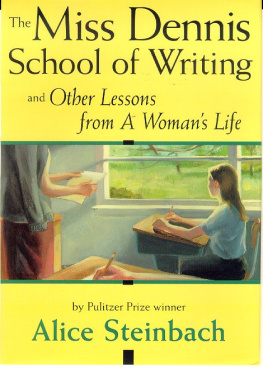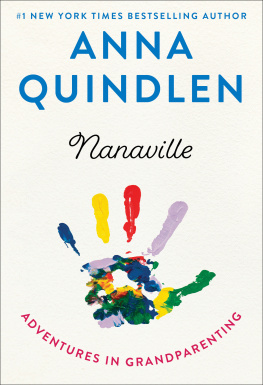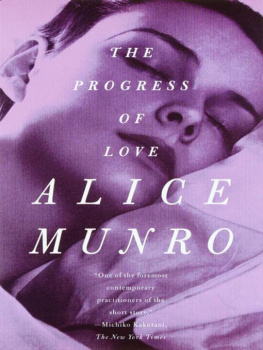Copyright 1996 by The Bancroft Press
All rights reserved. No part of this book may be reproduced in any form or by any electronic or mechanical means, including information storage and retrieval systems, without permission in writing from the publisher, except by a reviewer, who may quote passages in a review.
Published by The Bancroft Press, P.O. Box 65360, Baltimore, MD 21209. (410) 358-0658.
ISBN 0-9631246-2-5
Library of Congress Catalogue Card Number 96-85002
Printed in the United States of America
Designed by Melinda Russell Design, Baltimore, MD
Distributed to the trade by National Book Network, Lanham, MD
This book is for my mother, in memory
And for my sons, Andrew and Samuel
Acknowledgments
Grateful acknowledgement is made to the Baltimore Sun for permission to reprint the following pieces, in whose pages they originally appeared from 1985 to 1995.
I would also like to thank my publisher, Bruce Bortz, and my editor, Connie Knox, for their counsel and support.
Above all, I am grateful to my family and friends without whom the life described in these pages would have been less complete. My heartfelt thanks go to my brother and sister-in-law, Shelby and Patricia Carter, who many times have come to my rescue, providing love and support. And, of course, words cannot convey what I owe to my sons, Andy and Sam, who continue to grace my life with their presence.
Introduction
F rom a shoebox of old postcards I lift one out a view of Colettes grave in the famous Paris cemetery Pere Lachaise and read the following message:
Dear Alice,
Traveling here on the Metro, I sat next to a young Frenchwoman holding a huge spray of flowers pink roses, babys breath, yellow lilies, all wrapped in clear, florists paper that made crackling sounds each time the train leaned into a turn. By the time we reached Pere Lachaise, the entire metro car was filled with the scent of roses and lilies. It followed me all day and was waiting for me that evening when I returned to my hotel room. Falling asleep, I thought of my mother, of the Shalimar perfume she wore, of the way her clothes always seemed, at least to a small child, to smell of roses. You must try to remember this day, Alice: the day the scent of your childhood accompanied you, like a happy companion, through the winding paths of Pere Lachaise.
The postcard, dated June 1993, is signed: Love, Alice.
I first began sending postcards to myself about 15 years ago while on a trip to Bornholm, a small island in the Baltic Sea. I was traveling alone, tired and still reeling from the loss of an important figure in my life, when suddenly I succumbed to acute feelings of homesickness. By the second day of my stay, I found myself searching, like a sailor lost at sea, for something familiar, something to assuage my loneliness, and yearning for home.
Then one day, while walking along a road lined with fir trees, I came to an opening and found what I was looking for. There before me, bending to the wind, was a vast field of purple heather. Something inside me lifted and suddenly I was seeing the heather my Scottish grandmother lovingly described to me in the bedtime stories she wove about her life in Kirriemuir. I have seen this before, I thought, standing there in the heather of Bornholm, watching as the unfamiliar slipped off its strangeness and took on the guise of an old friend.
That night I wrote my first postcard to myself, describing what I had seen that afternoon and what I had felt. When I returned to Baltimore, the postcard was waiting for me. I turned it over, read through it and came to the last line: Try to remember this day: the heather, the wind, the peace that comes with knowing the familiar is everywhere.
In this book, I write about the familiar. Its taken a lifetime of learning to see that what has shaped me are not the lessons taught by the occasional encounter with the exotic moment. I take my form, instead, from the long, steady observation of the familiar; this is the force that has allowed me to see life whole and to make personal sense of it. It is this view that accounts for the recurring themes to be found in this book: family, friends, children, men, women, youth, aging, nature, home and, of course, cats.
What the reader will not find in these pages is the journalists stance of distanced objectivity. Here, the third person gives way to the first. I learned early in my life, from reading the incomparable E. B. White, that a private experience, if deeply examined, can have universal value. As a writing man, Mr. White observed in one of his essays, I have always felt charged with the safekeeping of all unexpected items of worldly or unworldly enchantment, as though I might be held personally responsible if even a small one were to be lost.
In these pages, I have tried to rescue from insignificance some of the small events that make up a life. My hope is that such a recounting will evoke in the reader a personal response, one that causes a nod of the head in recognition or a sudden laugh at the familiarity of whats being described.
Finally, there is a ghost who haunts this book: Miss Dennis. It was she who helped shape my writing self, so much so that I have devoted the entire opening essay to her. Even now, I cant think of her without remembering her favorite words: prairie and silver. She liked the sound of them, she said. It comes as no surprise that Ive managed to work both words into these pages. Miss Dennis, I think, would have wanted it that way.
Baltimore
June 1996
The Miss Dennis School of Writing
W hat kind of writing do you do? asked the novelist sitting to my left at a writers luncheon.
I work for a newspaper in Baltimore, he was told.
Oh, did you go to journalism school?
Well, yes.
Columbia? he asked, invoking the name of the most prestigious journalism school in the country.
Actually, no, I heard myself telling him. Im one of the lucky ones. I am a graduate of the Miss Dennis School of Writing.
Unimpressed, the novelist turned away. Clearly it was a credential that did not measure up to his standards. But why should it? He was not one of the lucky ones. He had never met Miss Dennis, my ninth-grade creative writing teacher, or had the good fortune to be her student. Which meant he had never experienced the sight of Miss Dennis chasing Dorothy Singer around the classroom, threatening her with a yardstick because Dorothy hadnt paid attention and her writing showed it.
You want to be a writer? Miss Dennis would yell, out of breath from all the running and yardstick-brandishing. Then pay attention to whats going on around you. Connect! You are not Switzerland neutral, aloof, uninvolved. Think Italy!
Miss Dennis said things like that. If you had any sense, you wrote them down.
I cant teach you how to write, but I can tell you how to look at things, how to pay attention, she would bark out at us, like a drill sergeant confronting a group of undisciplined, wet-behind-the-ears Marine recruits. To drive home her point, she had us take turns writing a description of what we saw on the way to school in the morning. Of course, you never knew which morning would be your turn, so just to be on the safe side you got into the habit of looking things over carefully every morning and making notes: Saw a pot of red geraniums sitting in the sunlight on a white stucco porch; an orange-striped cat curled like a comma beneath a black van; a dark gray cloud scudding across a silver morning sky.
Its a lesson that I have returned to again and again throughout my writing career. To this day, I think of Miss Dennis whenever I write a certain kind of sentence. Or to be more precise, whenever I write a sentence that actually creates in words the picture I want readers to see.
Next page







